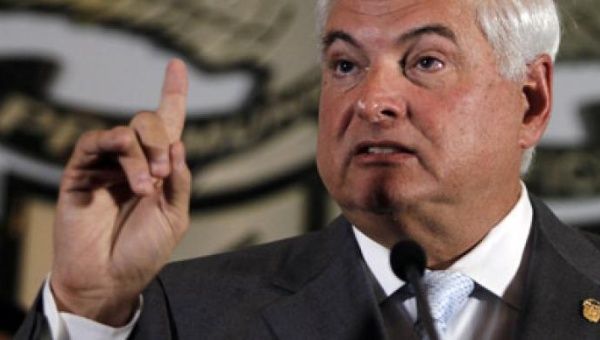From McClatchyDC by T. Johnson
PANAMA CITY — When the United States rejected former Panamanian President Ricardo Martinelli’s request for spying equipment to eavesdrop, U.S. diplomats feared, on his political enemies, the former supermarket baron turned to another source: Israel.
Now scores of Panama’s political and social elite are learning that the eavesdropping program that Martinelli’s security team set in place sprawled into the most private aspects of their lives – including their bedrooms. Rather than national security, what appears to have driven the wiretapping was a surfeit of the seven deadly sins, particularly greed, pride, lust and envy.
Nearly every day, targets of the wiretapping march to the prosecutors’ office to see what their dossiers contain, often emerging in distress. Martinelli, who left office in July, is facing a rising tide of outrage not only over the wiretapping, but also over reports of vast corruption. His personal secretary has left the country. The eavesdropping equipment has vanished.

Panama former President Ricardo Martinelli. | Photo: Reuters
“Martinelli was obsessed with knowing what everybody was gossiping or saying about him,” said Álvaro Alemán Healy, the Cabinet chief for the current president, Juan Carlos Varela. “He used to brag that he had a file or dossier on everybody who is important here in Panama.”
Martinelli’s request for U.S. assistance in setting up such a program – and the U.S. rejection – has been known for years; it was detailed in one of the tens of thousands of State Department cables made public by WikiLeaks. But new details of what happened after that rejection are just now emerging, and Panama is shocked.
A few days ago, prosecutors summoned legislator José Luis Varela, the current president’s brother, to review a partial dossier of emails and transcriptions of conversations that government snoops had culled from him and his family. Among them was an email his wife had sent to one of his grown sons. “It said things like, ‘You never finished university, you’re sleeping too much and you don’t have a goal in life,’” Varela recalled.
Wiretapping scandals are not new in Latin America, even under democratically elected governments. Colombia was rocked by a tapping scandal in 2008 that eventually led to the dissolution of its domestic investigative agency. Around the same period, reports of wiretapping under Peru’s then-president, Alberto Fujimori, were partly responsible for his eventual jailing.
Alemán said the government believes Martinelli’s security team kept active wiretaps on “between 150 to 175 people,” among them the Roman Catholic archbishop of Panama, opposition political leaders, rival business tycoons, supreme court judges, U.S. Embassy personnel, his own Cabinet members and even the woman identified publicly as his mistress.
Some of the targets say they long suspected that Martinelli’s security team spied on them, but they voice abhorrence at new details of the surveillance that have emerged in recent weeks.
“What shames me about this is how they used this information to destroy families, harm marriages, obtain business, hurt rival business, and even affect diplomatic relations,” said Miguel Antonio Bernal, a law professor and human rights activist who has filed a criminal complaint against Martinelli over the wiretapping.
When Martinelli first approached U.S. diplomats about helping him with wiretapping, he asked them to expand a U.S. program aimed at suspected drug traffickers, known as Matador, according to multiple secret U.S. diplomatic cables released by WikiLeaks in late 2010. When U.S. diplomats noted that U.S. and Panamanian law forbade such wiretapping, Martinelli turned to Israel, purchasing a $14 million package from MLM Protection Ltd., which offers “cutting edge, customized security solutions.”
Two of Martinelli’s former top security chiefs, Alejandro Garuz and Gustavo Pérez, were detained earlier this month in the wiretapping scandal, while two other security technicians are fugitives. An employee of the National Security Council has cooperated with prosecutors and is now under protection, apparently overseas.
“Former President Martinelli has no relation to these supposed events,” a spokesman, Luis Eduardo Camacho, said in a brief telephone interview. Once Martinelli left office, Alemán said, “the (wiretapping) equipment disappeared. It’s not here. We don’t know if it’s been taken out of Panama.”
The Israeli equipment offered sophisticated capabilities to the Panamanian snoopers, allowing not only the monitoring of cell and fixed-line telephone calls and emails but also Whatsapp and Blackberry texts. Moreover, the techs could burrow into hard drives and extract data and video, and remotely activate functions. They could also detect signals of nearby cellphones to determine who might be meeting.
